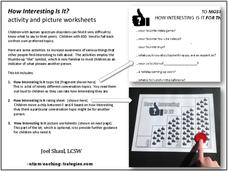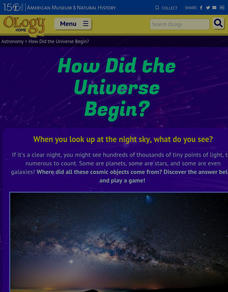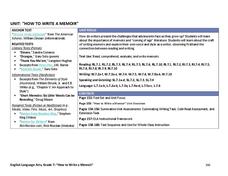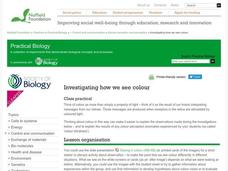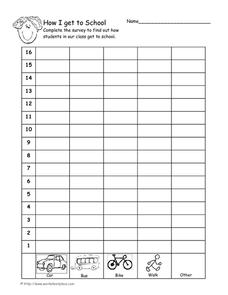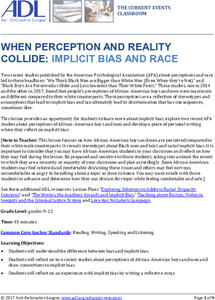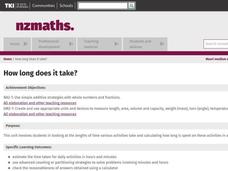Curated OER
Introduce Vocabulary: How to Make an Apple Pie and See the World (Priceman)
Ask budding readers, "How do you make an apple pie?" You may get many answers, but Marjorie Priceman takes the cake with her idea in How to Make an Apply Pie and See the World, an adventurous tale full of wonder and new vocabulary. Using...
Facing History and Ourselves
How Journalists Minimize Bias
Class members are challenged to write a neutral news story about the events they observe in a short video. After sharing their stories in groups and discussing the different perceptions, the class concludes with a video of journalists...
Science 4 Inquiry
Investigating How Heat Flows
It is impossible to cool down a glass of water by adding ice. Young scientists explore heat transfer through videos, experiments, and interactive games. They quickly catch on that the water melts the ice and things aren't always as they...
US Department of Health and Human Services
Alcohol: Why Drink When You Can…
Prepare your learners to make good decisions about drinking by providing them with the real facts about alcohol and substance abuse. This resource includes several worksheets explaining how alcohol affects the brain, as well as a general...
Curated OER
How Interesting Is It?
Discussing topics that other people are interested in is a key social skill that can often be overlooked. Here is a resource that supports learners in developing this life skill by first prompting them to consider a wide range of...
American Museum of Natural History
How Did the Universe Begin?
The Big Bang Theory is more than a television show. Pupils read how Edwin Hubble observed other galaxies and noticed that the galaxies are moving away from each other. Scholars learn about the idea of the big bang and what happened next...
Curated OER
Introduce Vocabulary: How Do Dinosaurs Say Goodnight? (Yolen and Teague)
If you are reading Jane Yolen's fun story How Do Dinosaurs Say Goodnight?, use these strategies to enhance the experience for budding readers. What new words will they learn? Find detailed comprehension questions for these in-text words:...
Curated OER
Introduce Vocabulary: How Do Dinosaurs Go To School? (Yolen)
Dinosaurs don't go to school...but what if they did? Use Jane Yolen's book How Do Dinosaurs Go To School to explore vocabulary in context. Find this on YouTube if you don't have the text on hand. These in-text words give some ideas of...
Louisiana Department of Education
How to Write a Memoir
Who are we and what shapes our identities? Seventh graders work to answer this question as they learn how to write a memoir. Full of non-print resources and supplemental texts that range from fiction to non-fiction, scholars write their...
Curated OER
2nd Grade - Act. 27: How Animals Prepare for Winter
What do animals do during the winter? Second graders will discover that some animals migrate and other hibernate during the winter. Using "How and Why Animals Prepare for Winter," by Elaine Pascoe, they will discuss and create a drawing...
Curated OER
The Present Subjunctive: How?
Once your class has mastered the indicative, it's time to present the subjunctive mood. This resource focuses solely on how to conjugate in the present subjunctive, but does link to more information on how to to use it. Class members can...
Serendip
How Do Biological Organisms Use Energy?
When an organism eats, how does food become energy? Young biologists follow glucose through the process of cellular respiration to the creation of ADP using a discussion-based activity. The resource also highlights conservation of mass...
Nuffield Foundation
Investigating How We See Colour
Can you eyes be fooled into seeing colors that aren't actually there? Budding scientists view a presentation that addresses this topic. They explore how their eyes interpret color through the retinas and messages sent to the brain. They...
Student Handouts
The Five W's and How
Here is a great graphic organizer for ensuring that young researchers and writers cover all their bases when brainstorming a topic by considering the five W's (who, what, where, when, and why) and how.
Worksheet Place
How I Get to School
Find out how many of your learners take the bus, how many walk, and how many bike with a quick survey. Class members gather data about how each individual gets to school and mark the results on this page in order to create a bar graph.
Facing History and Ourselves
When Differences Matter
Jane Elliott's controversial blue eyes/brown eyes experiment detailed in the film A Class Divided leads to a discussion of privilege, social power, and opportunity. Viewers note how the children react to the experiment, share their...
Anti-Defamation League
When Perception and Reality Collide: Implicit Bias and Race
The big idea in this lesson is that implicit bias often clouds perceptions. High schoolers watch a short video, read research articles, and engage in discussions about implicit bias and how these biases lead to stereotyping. They craft...
Curated OER
When the Wind Blows Lesson Plan
Learners read a book and observe the wind and how it affects the environment. They explore what wind does by looking at pictures, reading a book, and by completing an experiment. They will use their own knowledge of the wind and compare...
Bonneville
How to Build a Motor
Electrical engineers entertain and explain how to construct an electromagnet-driven motor. Kellie and Mike, the hosts of the show, are enthusiastic teachers that will help introduce a project that you likely include in your middle school...
Bonneville
How to Build a Turbine
Here is a six-minute video of a pair of electrical engineers that illustrate how to build a wind turbine. A list of materials is provided, along with general guidelines for your class. Use this to introduce turbine design to your...
Curated OER
How Long Does It Take?
Students investigate the lengths of time various activities take and calculate how long is spent on these activities in a week. They complete a worksheet for each activity that is timed, and calculate lengths of time for simulated...
Curated OER
How to Implement Project Based Learning to Engage Students
Can a math teacher employ project-based learning? Learn how one great math teacher uses PBL to design math projects that provide learners with a more challenging and holistic learning experience. A wonderful article, that includes three...
Curated OER
How Much Is A Million
Help young learners visualize the concept of "a million." To convey concepts of numeration and literacy, they will listen to the book How Much is a Million? by David Schwartz. They should be able to make self-to-text connections....
Next Generation Science Storylines
How Can We Sense so Many Different Sounds from a Distance?
Dive into the mystery of sound waves! Scholars brainstorm questions about how sound travels and why different items make different sounds. They then conduct experiments to answer their questions.
Other popular searches
- Who What When Where Why How
- Adverbs How When Where
- How/when/where
- Who What When Why How
- Who, What, When, Why, How
- Adverbs That Tell When and How
- Who What When Where and How
- Who, What, When, Where and How






